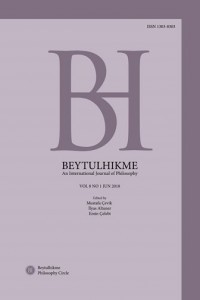Öz
One of the most
complicated problems of political philosophy is the emerging of the
individual. Questions such as when, where or in what way “individual” or
“mass man” emerged; what type of character he has; whether he developed
a morality understanding, political understanding, governing and being
governed types suitable for himself or not; in case he developed what
the basic characteristics of this morality and governing and being
governed types are; whether he is the crownless king of our era or not;
whether he needs leaders or administrators or not ; how he finds a place
for himself in human relations; what sort of effect he has on our
civilization or on the new gained rights, liabilities and the whole life
style are some of the basic questions which political philosophy tries
to find answers. The objective of this paper is to reveal how Michael
Oakeshott who asserts that the emerge of “individual” is the most
important event in Modern European history and “mass man” is completely a
derivation eliminates the basic fallacies in political philosophy with
the answers he gave to above questions, based on his essay of “The
Masses in Representative Democracy”
Anahtar Kelimeler
Michael Oakeshott individual mass man representative democracy popular government
Kaynakça
- Auspitz, J. L. (1976). Individuality, Civility, and Theory: The Philosophical Imagination of Michael Oakeshott. Political Theory, 4 (3), 261-294.
- Botwinick, A. (2011). Michael Oakeshott's Skepticism. Princeton: Princeton University Press.
- Feaver, G. (2005). Regimes of Liberty: Michael Oakeshott on Representative Democracy. (Eds. C. Abel & T. Fuller). The Intellectual Legacy of Michael Oakeshott. Exeter: Imprint Academic, 132-159.
- Granston, M. (1967). Michael Oakeshott's Politics. Encounter, 28 (1), 82-85.
- McIntyre, K. B. (2004). The Limits of Political Theory. Exeter: Imprint Academic.
- Oakeshott, M. (1991). The Masses in Representative Democracy. Rationalism in Politics and Other Essays. Indianapolis: Liberty Fund, 363-383.
- Oakeshott, M. (1993). Morality and Politics in Modern Europe. (Ed. S. R. Letwin). New Haven & London: Yale University Press.
- Oakeshott, M. (2003). On Human Conduct. Oxford: Clarendon Press.
- Orsi, D. (2016). Michael Oakeshott’s Political Philosophy of International Relations. Cham: Palgrave Macmillan.
- Podoksik, E. (2003). In Defence of Modernity. (Ed. N. O'Sullivan). Exeter: Imprint Academic.
- Rushton, M. (1992). Michael Oakeshott: A Review Essay. The Review of Politics, 54 (4), 665-674.
- Uyl, D. J. (2005). Spinoza and Oakeshott. (Eds. C. Abel & T. Fuller). The Intellectual Legacy of Michael Oakeshott. Exeter: Imprint Academic, 62-85.
- Coats, W. J. (2000). Oakeshott and His Contemporaries. London: Associated University Presses.
Öz
Kaynakça
- Auspitz, J. L. (1976). Individuality, Civility, and Theory: The Philosophical Imagination of Michael Oakeshott. Political Theory, 4 (3), 261-294.
- Botwinick, A. (2011). Michael Oakeshott's Skepticism. Princeton: Princeton University Press.
- Feaver, G. (2005). Regimes of Liberty: Michael Oakeshott on Representative Democracy. (Eds. C. Abel & T. Fuller). The Intellectual Legacy of Michael Oakeshott. Exeter: Imprint Academic, 132-159.
- Granston, M. (1967). Michael Oakeshott's Politics. Encounter, 28 (1), 82-85.
- McIntyre, K. B. (2004). The Limits of Political Theory. Exeter: Imprint Academic.
- Oakeshott, M. (1991). The Masses in Representative Democracy. Rationalism in Politics and Other Essays. Indianapolis: Liberty Fund, 363-383.
- Oakeshott, M. (1993). Morality and Politics in Modern Europe. (Ed. S. R. Letwin). New Haven & London: Yale University Press.
- Oakeshott, M. (2003). On Human Conduct. Oxford: Clarendon Press.
- Orsi, D. (2016). Michael Oakeshott’s Political Philosophy of International Relations. Cham: Palgrave Macmillan.
- Podoksik, E. (2003). In Defence of Modernity. (Ed. N. O'Sullivan). Exeter: Imprint Academic.
- Rushton, M. (1992). Michael Oakeshott: A Review Essay. The Review of Politics, 54 (4), 665-674.
- Uyl, D. J. (2005). Spinoza and Oakeshott. (Eds. C. Abel & T. Fuller). The Intellectual Legacy of Michael Oakeshott. Exeter: Imprint Academic, 62-85.
- Coats, W. J. (2000). Oakeshott and His Contemporaries. London: Associated University Presses.
Ayrıntılar
| Birincil Dil | İngilizce |
|---|---|
| Konular | Felsefe |
| Bölüm | Makaleler |
| Yazarlar | |
| Yayımlanma Tarihi | 21 Temmuz 2018 |
| Yayımlandığı Sayı | Yıl 2018 Cilt: 8 Sayı: 1 |


